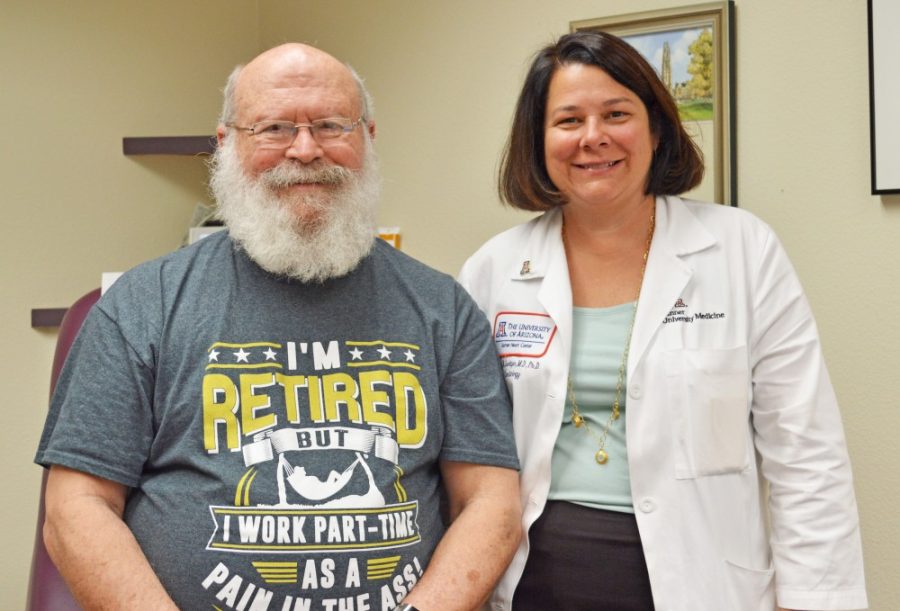A research team with members from the University of Arizona and the National Institutes of Health are looking to remedy the harmful side effects sometimes experienced by patients following heart bypass surgery.
When the surgery is performed, the surgeon will often use a technique called cardiopulmonary bypass, which uses a pump to act like the patient’s heart and lungs for the duration of the operation. The pump will keep the patient’s blood oxygenated and circulating while also allowing the surgeon to operate on a non-beating heart.

However, while the pump — often referred to as a heart-lung machine — has made cardiac surgery a much safer procedure, some patients have reported side effects of the surgery that even include memory loss.
“Just running your blood through the tubing of the machine elicits an inflammatory response of the body,” explains Dr. Nancy Sweitzer, director of the UA Sarver Heart Center and chief of the division of cardiology in the UA College of Medicine – Tucson.
“Your body knows that blood was just outside in some tube, and it doesn’t like that,” Sweitzer said. “So, there is an inflammatory response that typically lasts about 24-48 hours.”
This inflammation affects the brain as well as the rest of the body and is believed to be the cause of memory loss in certain patients.
RELATED: Creating Mars on Earth
But a procedure to prevent the associated memory loss may be on the horizon, thanks to UA research collaborators such as Sweitzer and Lee Ryan, UA professor and department head of psychology.
Angiotensin 1-7 is a naturally occurring peptide in the human body that has been studied and used extensively for its anti-inflammatory properties, particularly in regards to combating cancer. However, until recently, the peptide has had very little research done on its affect on the brain.
Dr. Meredith Hay, professor of physiology at the UA College of Medicine – Tucson and another primary collaborator on the UA research team, has studied the anti-inflammatory properties of the ang 1-7 peptide in lab mice and found promising results.
After administering the peptide to mice with heart failure, the memory loss was discovered to be completely reversed, according to Hay.
While Hay said curing the problem in mice is certainly a promising start, before the procedure can be used by the public, it must undergo further clinical trials to prove it’s safe for extensive use on humans.
Phase two of the trials is already underway, which includes the first use of human subjects. So far, two patients have completed the study out of a total of 90 participants. Hay said the process will take about four years to complete.
RELATED: One week of eating vegan
Participants will be given ang 1-7 or a placebo — administered as an injection — two hours before bypass surgery and will take the drug or placebo every day for 21 days after that.
A placebo is a “fake” form of the treatment that does not contain ang 1-7 and does not have a medical effect but is used as a control group for the trials.
Assuming all goes well in phase two, Hay said the procedure must also pass the phase three trial, which includes a much larger sample size of participants, often hundreds or thousands.
The second and third phases of clinical trials are generally used to determine how effective the drug or procedure is compared to placebos, according to Hay. If it is found to be effective, FDA approval can be requested to allow for public use.
Despite the long and rigorous testing process, Sweitzer said she remains optimistic.
“We felt that the drug has been used in enough humans that we weren’t so worried about the safety [of phase two trials],” Sweitzer said.
Though it will be a few years before they learn if all their hard has work paid off, in the meantime, Sweitzer said medical researchers at the UA will continue to find ways to improve the well-being of patients around the world.
“What I, and many of us on the medical campus, are trying to do is take the incredible scientific talent on our campus and start using the discoveries in people with health conditions,” Sweitzer said. “The translation of basic science and molecular science into human disease is hard and complicated, but I think we have a really unique environment on this campus to do that.”
Follow The Daily Wildcat on Twitter









